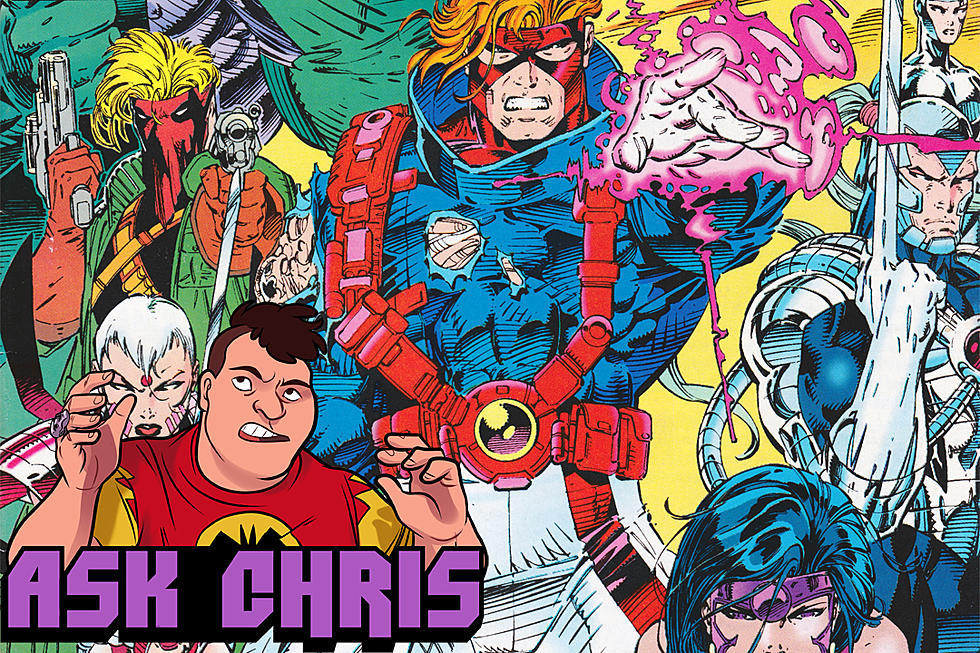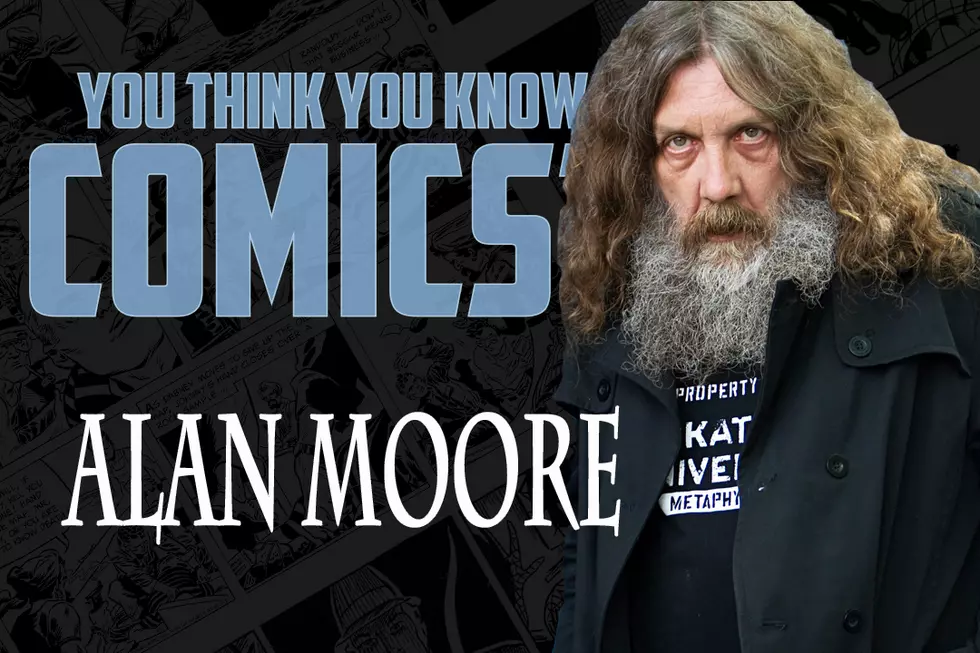
‘V for Vendetta’ Inspires Anonymous, Creator David Lloyd Responds

As a loose collective of so-called "hackers" labeled Anonymous continues to cause mostly harmless chaos around the Internet, a symbol born from Alan Moore and David Lloyd's graphic novel V for Vendetta has become synonymous with the cause of radical transparency online. The Guy Fawkes-style mask worn by the character V was first used by Anonymous as way to publicly protest what they saw as the harmful indoctrination of Scientology, but has since evolved to encompass an entire movement that is as seemingly diverse as it is secretive.
We decided to dig in to what the movement is trying to accomplish, as well as what creator Alan Moore thinks about the hacktivist group. ComicsAlliance also reached out to artist David Lloyd to find out how he feels about the graphic novel being associated with Anonymous.The loose, yet guided actions of Anonymous are almost like a real-world, non-violent Fight Club that some claim is primarily made up of disenfranchised youth who fall somewhere between the mid-to-lower income tax bracket, and are clearly self-aware of the pop-culture icons -- like V of V for Vendetta -- that have influenced them and thought processes.
Targets of the group have reportedly included the Church of Scientology, Bank of America, the Tunisian government, the Columbian secret police, and Sony. In 2010, after Wikileaks began releasing confidential United States diplomatic cables -- and Paypal cut off donations to Wikileaks under pressure from the U.S. government -- an Anonymous initiative called Operation Payback attacked the websites of Paypal, Mastercard, Visa, and the Swiss bank PostFinance, which had frozen legal defense funds for the incarcerated Wikileaks founder Julian Assange. After fourteen mostly younger men were later arrested for Distributed Denial of Service (DDos) attacks, Anonymous started an online boycott of a PayPal (along with a splinter group called Lulzsec), causing a $1 billion drop in the stock of Paypal's parent company, eBay.
Other members now say they are planning a worldwide protest that seeks to make citizens of any country more free through a three-phase, year-long operation that consists of several side missions. The month of August, for example, calls for members to participate in "random acts of kindness" as a way to foster community engagement.
In addition to spawning countless DIY art creations that are shared on forum sites such as 4Chan, Metafilter, Reddit and more, the V for Vendetta mask has also caught the attention of law enforcement officials such as the FBI.
Earlier this year, a 19-year-old girl, who once moderated an IRC chat room where people had discussed launching DDoS attacks against PayPal, was served a search warrant by the FBI early one morning in her parent's home. According to the girl, agents seized several electronic devices, including her computer and cellphone, but were also looking for a very specific item in an attempt to prove she was involved in criminal activity: a V for Vendetta mask. As she explained in an interview at Gawker:
The agent in charge of my particular warrant actually asked me if I owned a Guy Fawkes mask. I told him no and then asked him if he was disappointed that he wouldn't have a picture of "a real live Anon's mask" to hang in his office. He actually said yes.

While opinions about Anonymous, the V for Vendetta mask, and the reaction it has provoked from various world governments may differ wildly, the original creators seem to be happy with their character being used in such a divisive fashion.
The book's writer, Alan Moore, is famously scarce when it comes to speaking to the press, but in an earlier interview with Entertainment Weekly, he was quoted as saying, "I was also quite heartened the other day when watching the news to see that there were demonstrations outside the Scientology headquarters over here [in England], and that they suddenly flashed to a clip showing all these demonstrators wearing V for Vendetta masks. That pleased me. That gave me a warm little glow."
ComicsAlliance also reached out to V for Vendetta artist David Lloyd (Kickback), who is planning to release a collection of short stories called Dark Matter later this year, to find out more about his inspiration for the book and how he feels about Anonymous adopting its iconic imagery.
ComicsAlliance: Rumor has it that V for Vendetta was a reaction to the conservative administration of Margaret Thatcher -- was it? And do you see any parallels to what's happening now in today's politics?
David Lloyd: No, [the graphic novel] was initially a response to the rise of support for the National Front in England. 1977-'79 was a high-unemployment period, and that's when the anti-immigration bunch get stronger -- in line with the same crew in the Conservative Party. As time progressed, and Margaret Thatcher became more radical, she was a spur to our endeavour, of course. Now? Yes, the rise of the influence of the Tea Party reflects the rise of radical Conservatism in the late '70s in the UK. Bad news for you guys. And something Larry and Andy [Wachowski] were obviously concerned about in their version of the story on film.
CA: Why was Guy Fawkes an inspiration for the the character V?
DL: He was a fellow revolutionary from history, and the idea of having our character adopt the persona, costume, and - by accident - his failed mission, gave us the theatricality we needed, when that was the one missing element in its development.
CA: Is there something truly British about the legend of Guy Fawkes that people elsewhere will have a hard time understanding?
DL: No. He was a revolutionary, like many revolutionaries elsewhere, except that hi aim, and that of his fellow plotters, was the only to create chaos from which a better order might arise, rather than to change the whole structure of government.
Were you actively upset with the government or other authority institutions when creating the original story?
Yes. Both myself and Alan -- and almost every creative in our business were anti-Conservative and Socialistic.

CA: Next year, V for Vendetta will celebrate its twentieth thirtieth anniversary. If you were construct a similar story today, what would be similar, and what would be different?
DL: Can't imagine anything would be, if were to erase the effect V has already had in the business and the world it's reached.
CA:When we were speaking before, you mentioned that the V mask has become an icon much in the same way Che Guevara is of late. Does that somehow reduce the spirit of what you had in mind when creating the comic series?
DL: Why? Che was as imperfect as V as a revolutionary and as a human being, but he was as dedicated to his ambitions as V. V is too sophisticated a creation to be a copy of Che, but he doesn't suffer in a comparison with him. Though he does, of course, as created character and not a real one!
CA: Alan Moore seems to have embodied the ideal of anarchy in the most sincere sense into the character of V. Does that notion of complete individual freedom appeal to you?
DL: I never thought Anarchy would work as a viable way of running society, but it's a great dream to think it could. But, to maintain individuality of thought and action in a societial structure, and be unaffected by the oppression of conventional manipulation, is a fundamental need for everyone to maintain, and, for me, that's the most important theme of the story.

CA: What does it feel like to have been part of creating a character that, years later, still stands as a symbol of rebellion?
DL: Good.
CA: Do you have any opinion of what the group labeled as 'Anonymous' is doing?
DL: They seem to be resisting oppression the best way they know how. I haven't enough knowledge of them to offer view of greater value.
CA: What do you hope the future holds for the character V?
DL: A future as a symbol of protest for all those who feel they need to use it as such.
More From ComicsAlliance









